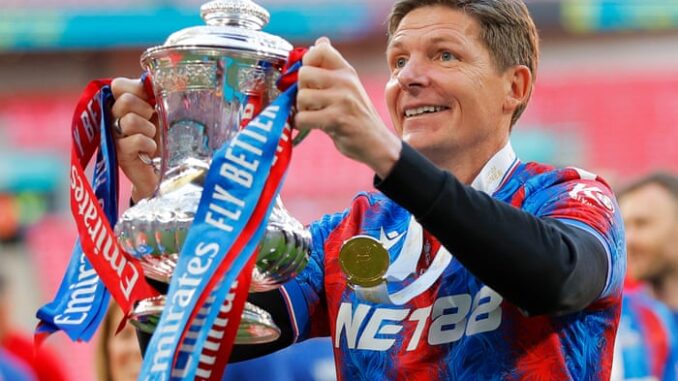
When Oliver Glasner arrived at Crystal Palace in early 2024, he inherited a club teetering on the edge of inconsistency and self-doubt. The Eagles were hovering near the bottom half of the Premier League table, struggling for rhythm and identity. Fast-forward to the 2025 season, and while results have improved under Glasner’s meticulous guidance, the Austrian manager remains deeply cautious — a man fully aware that Premier League management can be brutally unforgiving.
His words, “In November they sacked him,” were not a dig at his predecessor, but a humble reminder of how quickly fortunes can turn in football. The “him” in question was Roy Hodgson, a club legend who was dismissed mid-season after a difficult run of form. Glasner’s comment reflects a powerful truth: in the Premier League, survival and success depend not only on tactics and talent but on timing, momentum, and the patience of those above you.
Glasner, who previously led Eintracht Frankfurt to Europa League glory in 2022, has built his reputation on structure, discipline, and adaptability. His tactical vision — a blend of compact defending and explosive counter-attacks — has given Palace a new sense of purpose. Players like Eberechi Eze, Michael Olise, and Jean-Philippe Mateta have flourished under his dynamic approach, with the team showing both flair in attack and resilience at the back.
Yet, despite the positive energy at Selhurst Park, Glasner’s tone remains grounded. In interviews, he has often stressed that no manager in the Premier League can ever feel “safe.” He knows that expectations can shift overnight, especially in a league where even mid-table clubs dream of Europe and financial stakes are sky-high.
“Every game is a test,” Glasner noted recently. “In this league, you can beat anyone on Saturday and be under pressure again the next weekend. That’s why I take nothing for granted.”
Behind that humility lies experience. Glasner’s time in Germany was marked by both triumph and tension. At Wolfsburg, he guided the club to Champions League qualification, only to depart months later following disagreements with management. At Frankfurt, he reached unprecedented European heights but still faced internal friction before moving to England. Those chapters taught him that success in football is rarely enough to guarantee job security — especially in a results-driven environment like the Premier League.
At Palace, he’s using that hard-earned wisdom to foster balance — demanding excellence while maintaining perspective. Training sessions are known to be intense but organized, and his man-management skills have earned him respect in the dressing room. Players describe him as “honest, demanding, and fair,” qualities that have restored confidence to a team once weighed down by uncertainty.
Still, Glasner’s realism keeps him vigilant. He has seen how managerial cycles spin fast in England — how a three-game losing streak can trigger panic, or how fan sentiment can shift in weeks. For that reason, he celebrates wins quietly, focuses on progress, and reminds his players that complacency is the real enemy.
As Crystal Palace continue to build under Glasner’s watch, the Austrian’s mantra remains steady: respect the process, stay humble, and never assume tomorrow will be as kind as today. In a sport where the line between hero and headline casualty is razor-thin, Oliver Glasner is determined to walk it wisely — taking nothing for gran
ted.
Be the first to comment